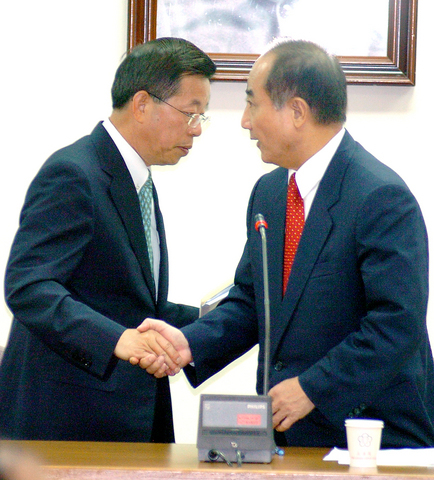Despite Premier Frank Hsieh's (謝長廷) unprecedented visit to the legislature during the summer recess, a second-round of cross-party negotiations on holding a special legislative session failed to bear fruit yesterday.
Legislative Speaker Wang Jin-pyng (王金平) ruled that an informal plenary talk will be held next Friday to discuss the issue again as well as what bills would be screened during the session.
Wang also suggested that the next legislative session start on Sept. 13, about two weeks earlier than usual.

PHOTO: LIAO CHEN-HUEI, TAIPEI TIMES
The Democratic Progressive Party (DPP) caucus wanted the plenary talk to be held either Monday or Tuesday, but Wang said next Friday would be more appropriate because government agencies need more time to include lawmakers' opinions into the proposed eight-year, NT$80 billion flood-fighting program.
Opposition caucuses also need time to map out their own version of the flood-prevention bill, Wang said.
"The next few days will be critical," Wang said. "I'm afraid the DPP caucus will be the biggest loser if they still refuse to budge."
The DPP caucus wants to get six priority bills passed during the special session. It plans to put its proposal to a vote at the plenary talk if necessary.
Opposition caucuses, however, may use their numerical advantage to veto the DPP's proposition.
Before yesterday's meeting, Hsieh led a team of government officials to brief lawmakers about the flood-fighting proposal.
Hsieh said government flood-fighting efforts during the Chinese Nationalist Party (KMT) administration had failed to resolve the problem and that the proposed project was approved by the Executive Yuan in May, not at the last minute.
Although opposition caucuses said they agree the flooding problem needs desperately to be addressed, they don't like the government's proposal.
The People First Party (PFP) caucus walked out of the meeting as Hsieh was answering legislators' questions, claiming that lawmakers were not given enough time to voice their opinions.
One representative from each caucus was given three minutes to discuss the proposal.
The PFP caucus also refused to dispatch any representative to attend the inter-party talk which followed Hsieh's briefing.
Calling the government's flood-control plan as "crudely prepared," PFP Legislator Chang Hsien-yao (
"How do they expect us to believe that the government is well prepared to do the job when there is no feasibility assessment nor a clear goal set in its report," he said.
PFP Legislator Li Yong-ping (李永萍) said the entire project was a political ploy to court southern voters for the year-end city mayor and county commissioner elections.
KMT caucus whip Lai Shyh-bao (
Lai also criticized the government's plan as "roughly sketched."
"The NT$80 billion bill contains only seven articles and 1,600 words -- or NT$50 million per word," Lai said.
"I'm very curious to know as to why the premier's predecessors failed to solve the flooding problem despite spending more than NT$20 billion a year over the past five years, but Premier Hsieh thinks he can do it with an investment of NT$10 billion a year for the next eight years," he said.
Taiwan Solidarity Union (TSU) caucus whip David Huang (
Huang, however, requested the government clearly stipulate the ultimate goal of the project and the source of its funding.
Independent Aboriginal Legislator May Chin (

An essay competition jointly organized by a local writing society and a publisher affiliated with the Chinese Communist Party (CCP) might have contravened the Act Governing Relations Between the People of the Taiwan Area and the Mainland Area (臺灣地區與大陸地區人民關係條例), the Mainland Affairs Council (MAC) said on Thursday. “In this case, the partner organization is clearly an agency under the CCP’s Fujian Provincial Committee,” MAC Deputy Minister and spokesperson Liang Wen-chieh (梁文傑) said at a news briefing in Taipei. “It also involves bringing Taiwanese students to China with all-expenses-paid arrangements to attend award ceremonies and camps,” Liang said. Those two “characteristics” are typically sufficient

A magnitude 5.9 earthquake that struck about 33km off the coast of Hualien City was the "main shock" in a series of quakes in the area, with aftershocks expected over the next three days, the Central Weather Administration (CWA) said yesterday. Prior to the magnitude 5.9 quake shaking most of Taiwan at 6:53pm yesterday, six other earthquakes stronger than a magnitude of 4, starting with a magnitude 5.5 quake at 6:09pm, occurred in the area. CWA Seismological Center Director Wu Chien-fu (吳健富) confirmed that the quakes were all part of the same series and that the magnitude 5.5 temblor was

The brilliant blue waters, thick foliage and bucolic atmosphere on this seemingly idyllic archipelago deep in the Pacific Ocean belie the key role it now plays in a titanic geopolitical struggle. Palau is again on the front line as China, and the US and its allies prepare their forces in an intensifying contest for control over the Asia-Pacific region. The democratic nation of just 17,000 people hosts US-controlled airstrips and soon-to-be-completed radar installations that the US military describes as “critical” to monitoring vast swathes of water and airspace. It is also a key piece of the second island chain, a string of

The Central Weather Administration has issued a heat alert for southeastern Taiwan, warning of temperatures as high as 36°C today, while alerting some coastal areas of strong winds later in the day. Kaohsiung’s Neimen District (內門) and Pingtung County’s Neipu Township (內埔) are under an orange heat alert, which warns of temperatures as high as 36°C for three consecutive days, the CWA said, citing southwest winds. The heat would also extend to Tainan’s Nansi (楠西) and Yujing (玉井) districts, as well as Pingtung’s Gaoshu (高樹), Yanpu (鹽埔) and Majia (瑪家) townships, it said, forecasting highs of up to 36°C in those areas